State Rep. David Rutledge still vividly remembers a day in the early 1960s that he says both haunted him for a long time and steered him toward a career in public service.
He was in the ninth grade, living with his family in Chattanooga, Tenn., and he worked after school in a barber shop, carrying out the humble task of shining shoes.
One day while he was working, Rutledge said, the barber sent him down to the corner drug store to get a sandwich.
Clik here to view.
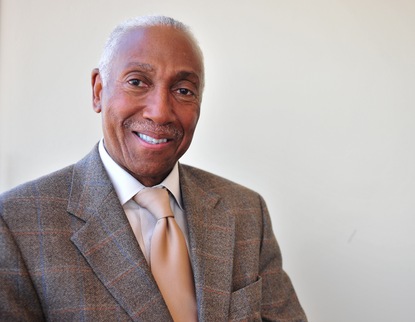
Now in his second term in the Michigan House of Representatives, David Rutledge, D-Superior Township, was recently elected Democratic floor leader.
Ryan J. Stanton | AnnArbor.com
But he was black, and they were white.
"And so a guy tapped me on the shoulder, identified himself as a manager, and said, 'You have to get up. You can't sit there.' And I said, 'But I'm waiting on a sandwich. I placed an order.' And he said, 'I don't think you heard me. You can't sit there.' And then he pushed me."
Rutledge said the push caught him by surprise, and he fell down, angry and embarrassed. Nobody came to his aid, he said, and instead they just watched.
"And I thought while I was lying there, looking up at this big guy, that he had some authority to do that," Rutledge said. "He had some power to do that."
The experience shaped Rutledge, and he soon decided he wanted someday to be in the place where the rules of society were being made.
"I felt so powerless at the time, and I didn't think anybody should feel that powerless in the face of injustice," he said.
Rutledge's long journey to the Michigan House of Representatives is a story of humble beginnings, patience and persistence, but he says he's now living the dream.
"People often say to me, 'Are you having fun in Lansing? Are you enjoying what you do?' I don't know if fun is the right word, but I am doing what I think I was called to do," he said.
Clik here to view.
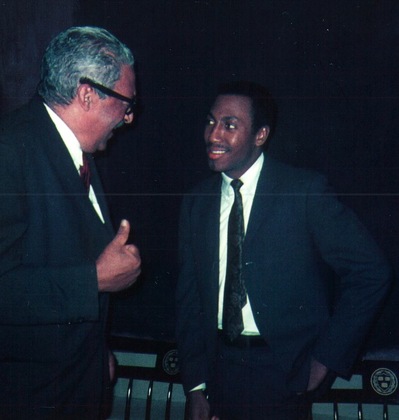
During his junior year at Tennessee State University in the 1960s, Rutledge received a scholarship to attend an intensive study of law at Harvard University, where Thurgood Marshall was his mentor. "He was a leader, but he was also about doing something useful for your fellow man, and so that's where I developed this philosophy of servant-leader," Rutledge said.
Courtesy photo
"Because that's what I always wanted to do," he said. "I always saw law school as a stepping stone. I really never wanted to do private practice, and in Michigan what they tried to shape me into doing was corporate law."
After losing his first race for county commissioner, Rutledge later was elected and served two terms as Superior Township's supervisor from 1980 to 1988.
He also served on a number of other boards over the years, including the Washtenaw County Parks & Recreation Commission, the Washtenaw County Road Commission and the Washtenaw Community College Board of Trustees.
Now in his second term in the state House, his peers recently named him Democratic floor leader, making him second in command to Democratic Leader Tim Greimel.
Rutledge, who lives just outside of Ypsilanti and represents eastern Washtenaw County, sat down with AnnArbor.com to talk about his new position and what he's up to in Lansing.
AnnArbor.com: Congratulations on being elected Democratic floor leader by fellow members of the House Democratic Caucus. What does this mean for you?
Rutledge: For me, it means being at the leadership table, participating in the decision-making process that affects my caucus. So, from that perspective, I think I can add some input. I certainly can bring a broad background of experiences to the decisions we have to shape there.
AnnArbor.com: To the average citizen back home in Washtenaw County, and the communities you represent here, what does this mean? Do our local priorities get a stronger voice now?
Rutledge: I think what it will mean for my district is that — along with a seat at the leadership table comes the respect of other leaders, and even department heads around state government. And so I won't hesitate to use that leadership role to lean on others to bring things — particularly economic opportunity — to the area that I represent.
AnnArbor.com: What kinds of economic opportunities?
Rutledge: I already have a meeting set up with the leadership of the city of Ypsilanti, the City Council actually, to talk about economic opportunities, and some ideas that I have about how to bring the budget more in line with it being balanced and over a long term. So one of the things we have to discuss is the Water Street project, because it presents such a burden to the city.
Clik here to view.
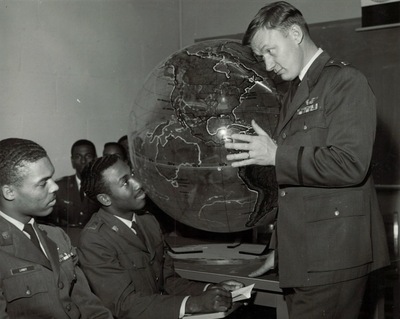
Rutledge headed straight into the U.S. Air Force after college and was trained as a personnel officer, commissioned as a second lieutenant, and assigned to the Mount Laguna Air Force Station in California for two and a half years before shipping out to Newfoundland. "It turned out they were going to ship me overseas somewhere — it was either Southeast Asia or Newfoundland, and my mom and dad would say it wasn't luck (that it wasn't Southeast Asia). They would say, 'We prayed for you. We were on our knees.' "
Courtesy photo
AnnArbor.com: What are your top priorities right now in the Michigan House? What kinds of issues will you be pushing as the Democratic floor leader?
Rutledge: Education remains a priority — not just with me, but inside our caucus. Also important to me and my caucus is the economic development piece, especially from a small business perspective.
As floor leader, I will challenge our caucus to get more active in shaping policy that would be effective for small businesses. I come out of small business. It may appear that I've been in long-term government positions, but I've started several small businesses, including a dry cleaners, a convenience store and an environmental services organization, so those are the pieces that are important. And one additional one: Roads and the investment in our infrastructure. And it's not just about roads, but also public transit.
AnnArbor.com: On those kinds of issues, where are the Democrats still not seeing eye to eye with the Republicans? And where are the two parties able to collaborate or compromise?
Rutledge: Collaboration is tough. And I think in many ways it's tough because of term limits. If you're going to collaborate, there needs to be an established trust level — an established relationship. And under the current circumstances in Lansing, time just does not permit that. And right now there's a very negative trust level because of things that occurred during the lame duck of last session.
Clik here to view.
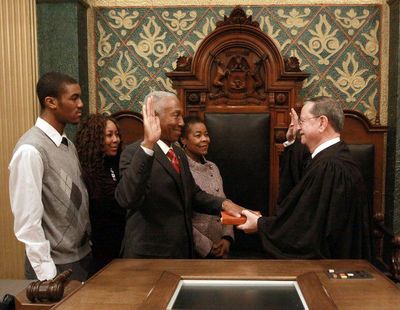
Rutledge being sworn in as state representative for Michigan's 54th District, which includes Ypsilanti and surrounding areas in eastern Washtenaw County.
Courtesy photo
AnnArbor.com: You've had some concerns with each of the state budgets that have gone through since you've been in office. In terms of where we're investing our money as a state, where do you believe we're getting it right and where are we getting it wrong?
Rutledge: I think where we're getting it wrong is not looking at our higher-education, world-class institutions in terms of infusing dollars there. The state should be saying it's a priority for us in terms of our economic development, in terms of attracting and keeping our young talent in this state.
While it inches up a couple of percentages in the new budget, it's still not where it should be. The good part is they are recognizing the need to increase early childhood education. That's a positive thing. They are recognizing the need to keep community colleges strong. That's a positive thing.
We still have not yet nailed down this investment in infrastructure — roads. So that still hangs out there as something I'm a proponent of. I think we need to find a way to improve our crumbling roads and bridges, and that means an additional investment.
AnnArbor.com: The House Democrats' Education Task Force, which you serve on, held its first meeting in late May. Can you give any indication what might come of those talks?
Rutledge: I think you're going to see a roadmap of what we think is necessary to get to quality in all public schools — across the spectrum. That means charters and that means public or community governed schools. And I think you're going to see an emphasis placed on something that the governor is already looking at, and that's early childhood.
I think you're going to see an emphasis placed on teacher preparation. And I think you're going to find an emphasis on how do we start infusing some appreciation back into the teaching corps.
Clik here to view.
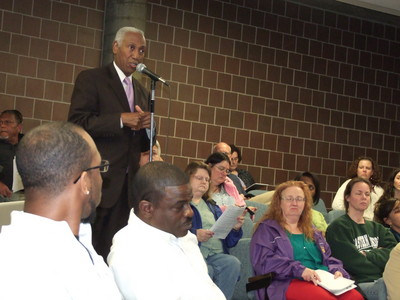
Rutledge addresses school leaders at a packed Ypsilanti-Willow Run community meeting in April 2012. Rutledge cites his role in helping to facilitate the merger of the two school districts as one of his achievements as a state representative for the 54th District.
Danielle Arndt | AnnArbor.com
AnnArbor.com: You've been in office nearly two and a half years now. Can you give me an example of what you've been able to accomplish as a member of the minority party?
Rutledge: From the vantage point of state rep, I have been able to leverage conversation within my own community, within my district, to bring two school districts together (Ypsilanti and Willow Run). I saw coming an emergency manager, and that was something that I thought would not be a good, productive thing. So over a period of time — more than a year from when we initiated those conversations — we got the two boards and their superintendents onboard, along with the ISD.
And now you look at the history of this — two communities voted to (merge the school districts), and it will happen beginning this fall.
I was able to work with Rep. Bill Rogers, who represents part of Livingston County and also serves on the appropriations committee. He and I formed a really good relationship, and it's on the basis of that relationship that I was able to get $6 million of a $10 million pot that the governor had set aside in the 2012 budget for consolidation efforts. I mean, statewide, to have $6 million of $10 million come into that district was huge.
Clik here to view.
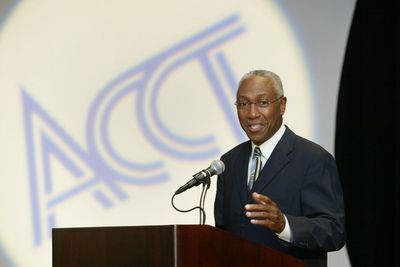
Rutledge served on the governing boards for both Washtenaw Community College and the national Association of Community College Trustees before being elected to the state House in 2010. "A real passion of mine is community colleges," he said. "Not just because it's higher education, but because it's a place where you can get second chances and third chances — it's a place where you can really get nurtured in a very special way."
Courtesy photo
Rutledge: That was, if I recall, a bill from Rep. Kurt Heise, and I think that bill is going nowhere.
On both sides of the aisle, I think it's understood that, in Southeast Michigan, a key element in attracting business and attracting young talent is to have a strong public transit network. And it can't happen other than in a regional way, and so the Heise bill would blow up that if there were an opportunity to opt out.
Now let me quickly say, I proposed a bill to opt Washtenaw County out — principally to support Mayor John Hieftje's efforts around the fact that each member that sits on this authority has a veto power on rail. And of course Ann Arbor in our county is pretty high on rail as a transit mechanism, and so I put that bill in not to blow up the thing, but as a placeholder for further negotiations.
AnnArbor.com: So there's no real push at this point to remove Washtenaw County from the Regional Transit Authority?
Rutledge: No. It looks like we're going to stay in this. It also looks like we're going to tone down this idea of a veto of rail. I do think there will be an understanding reached among the parties there.
Clik here to view.
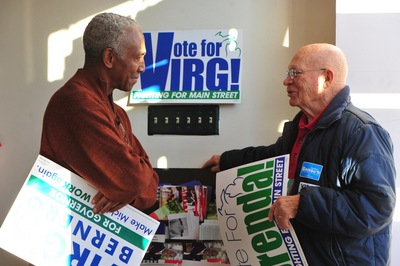
Rutledge on the campaign trail in 2010.
Ryan J. Stanton | AnnArbor.com
Rutledge: That the voters will see the need to bring back some balance to the Legislature. We're woefully missing that now with the Republicans controlling everything. I would be saying this if the Democrats controlled everything. Where there is no balance, there is more likelihood than not that there won't be good public policy.
So there needs to be this give and take, and so that's my greatest hope. And of course I am specifically hoping and will be very heavily engaged in the Democratic caucus — now the minority — becoming the majority.
AnnArbor.com: All politics aside, I'm told on July 8 you'll be chairing the Ann Arbor Charity Golf Outing for the 17th year in a row to raise money for the local chapter of the Alzheimer's Association. What is this event all about and how can people can get involved?
Rutledge: Seventeen years I've been doing this, and I don't know where the time went, but I started this as a remembrance of my mom, whom I watched pass away with this dementia.
So much progress has been made since that time that a lot of families are in fact being helped — both on the level of medications and the research it's producing, but also the way we are helping families deal with having family members that have this dementia setting on to them. So it's my little way of trying to give back. It will happen again at Travis Pointe Country Club.
The general public is invited to participate. If you've been touched by this disease at all and want to either participate by playing or by contributing to the local chapter of the Alzheimer's Association, all of the dollars raised at this event will stay in the Washtenaw County community.
Ryan J. Stanton covers government and politics for AnnArbor.com. Reach him at ryanstanton@annarbor.com or 734-623-2529. You also can follow him on Twitter or subscribe to AnnArbor.com's email newsletters.